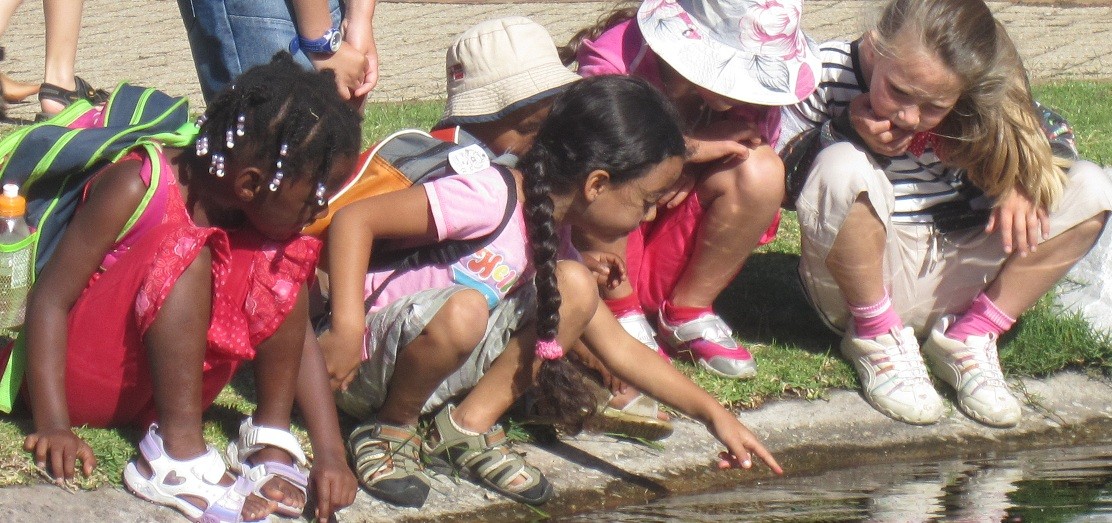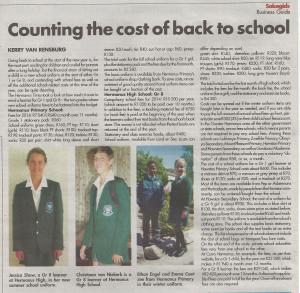Article published in the Hermanus Times, 23 January 2014
COUNTING THE COST OF BACK TO SCHOOL
By Kerry van Rensburg
Going back to school at the start of the new year is, for the most part, exciting for children and a relief for parents after a long holiday. But the financial strain of kitting out a child in a new school uniform at the start of either Gr 1 or Gr 8, and contending with school fees as well as all the additional school-related costs at this time of the year, can be quite daunting.
The Hermanus Times took a look at how much it costs to enrol a learner for Gr 1 and Gr 8the two grades where new school uniforms have to be factored into the budget.
- Fees for 2014: R7040 ( R640 a month over 11 months).
- Grade 1 stationery pack: R360
- School uniform: green dress: R160; PT top: R110; skort (girls): R110; boys black PT shorts: R100; tracksuit top: R190; tracksuit pants: R130; shoes: R120; tackies: R120;
- socks: R20 per pair; shirt white long sleeve and short sleeve: R50 each; tie: R40; sun hat or cap: R60; jersey: R130.
The total costs for the full school uniform for a Gr 1 girl, plus the stationery pack and the fees due for the first month, amounts to R2240.
The basic uniform is available from Hermanus Primary’s school uniform shop/clothing bank. To save costs, an assortment of good quality second-hand uniform items can be bought at a fraction of the cost.
Hermanus High School: Gr 8
- Compulsory school fees for 2014: R10200 per year, (which amount to R1020 to be paid over 10 months.)
- In addition to the fees, a teaching-material fee of R750 (or book fee) is paid at the beginning of the year when the learners collect their text books from the school’s book store. This money is not refunded when the text books are returned at the end of the year.
- Stationery and class exercise books, about R400.
- School uniform, available from Land en See: (costs can differ depending on size):green skirt: R140; sleeveless pullover: R220; blazer: R445; white school shirt: R50; tie: R119; long navy blue trousers (girls): R170; jersey: R250; PT shirt: R160;PT shorts: R90; tracksuit: R480; socks: R20 for 2 pairs; shoes: R230; tackies: R200; long grey trousers (boys): R90.
The total initial cost for the first month of high school, which includes the fees for the month, the book fee, the school uniform (for a girl), and the stationery and exercise books, is R4300.
Costs can be spread out if the winter uniform items are bought later in the year as needed, and if you are able to pay the full amount of annual school fees up front, parents can save R302 (3%) on their child’s school-fee account.
In the Greater Hermanus area all the other government or state schools, are no fees schools, which means parents are not required to pay any school fees. Among these schools are: Lukhanyo Primary, Zwelihle Primary, Qhayiya Secondary, Mount Pleasant Primary, Hawston Primary and Hawston Secondary, as well as Gansbaai Akademie. Some parents from these schools do pay a voluntary “donation” of about R50, or so, a month.
The cost of a school uniform for a Gr 1 girl learner at Hawston Primary School costs about R600. This includes a maroon skirt at R70; a maroon or grey jersey at R70; shoes at R120; socks at R20; and a tracksuit at R270. Most of the items are available from Pep or Ackermans and the tracksuits, made by people from the Hawston community, can be ordered/bought from the school.
At Hawston Secondary School, the cost of a uniform for a Gr 8 girl is about R935. This includes a blue skirt at R130, the shirt, socks, shoes same price as stated before; sleeveless pullover R150, tracksuit jacket R245 and tracksuit pants R110. The uniform is available from the school’s clothing store. The school also supplies basic stationery, some exercise books and all the text books at no extra charge. This list of expenses for all schools does not include the cost of school bags or transport/bus fare costs.
On the other end of the scale, private school education fees vary from one school to the other.
At Curro Hermanus, for example, the fees, as per their website, for a Gr 1 child, for the year are R23280, which makes it R1940 a month over 12 months.
For a Gr 8 learner, the fees are R29040, which makes it R2420 per month over 12 months. A discount is applicable if fees are paid in full for the year. Once-off enrolment fees are also required.
Response to the Article by Shirley Erwee
To the Editor of the Hermanus TimesAs a homeschooling parent, I read with interest the article on page 12 of the Hermanus Times, 23 January 2014, about the costs of schooling in Hermanus in 2014.
Readers might be interested to learn that home education is a legal educational choice, with many significant benefits and saving money is definitely among them.
Home education generally costs less than institutional schooling, because there are no school buildings to maintain or teachers’ salaries to pay and parents can choose how much they spend on curriculum materials.
Where both parents work outside the home, the choice for home education often requires that one parents must quit their job, to be at home with the children. Due to the prospective loss of income, many parents view home education as an expensive choice. However, if all the costs of schooling (e.g. school fees, uniforms, lunch money, fund-raising, transport), as well as the costs associated with working, (transport, professional clothing, make-up, lunches, daycare etc.) are taken into account then home education is not as expensive as is generally perceived. Many homeschooling parents also start home-based enterprises to supplement the family income.
This online calculator provides a tool to calculate to nett cost of home education for South Africans:
Besides possibly saving families thousands of rands, some of the many other benefits that home education offers are:
- one-on-one tuition,
- special needs and abilities can be catered for,
- it promotes better family relationships,
- children experience less negative peer pressure and are not exposed to bullies, violence, drugs or other social vices,
- the parents’ values, moral and religious beliefs are not contradicted by the state’s values, children develop better social skills than their school-going peers,
- students have the freedom to pursue their passions and sports and can manage their time better.
Extensive research in the USA has shown that home education works and produces well-educated learners who become successful and socially responsible citizens as adults, regardless of the income level, educational level and ethnicity of the parents. Even parents who dropped out of school can successfully home educate their children!
At high school level, most SA homeschoolers opt for accredited distance education courses and many write internationally-recognised school-leaving examinations such as Cambridge International Examinations or the American GED and SATs. They are readily accepted and succeed at universities and colleges, both in SA, online and abroad.
Home education succeeds because it is child-centred. The education is tailored to suit each individual child to ensure mastery and home educating parents are usually highly motivated to help their children achieve success in education and in life!
The recent growth in the home schooling community in South Africa is largely fuelled by dissatisfaction with a failing public school system. Parents are finding that home education generally offers a better quality education – and for less money too!
Prospective home educators in the Overberg can find more info about starting homeschooling at our local support group’s blog at https://overberghomeschoolers.wordpress.com/starting-homeschooling/
Here is another interesting article on the cost of homeschooling, from the UK – much of it applies here in South Africa too:
Home Schooling: Good for Your Child & Your Finances?
“A good education will teach your child all the life skills they need to succeed and set them up for the future. A home education can be just as rewarding as sending them to school, but does it make financial sense? We investigate…”
Click on the link above to read more.

